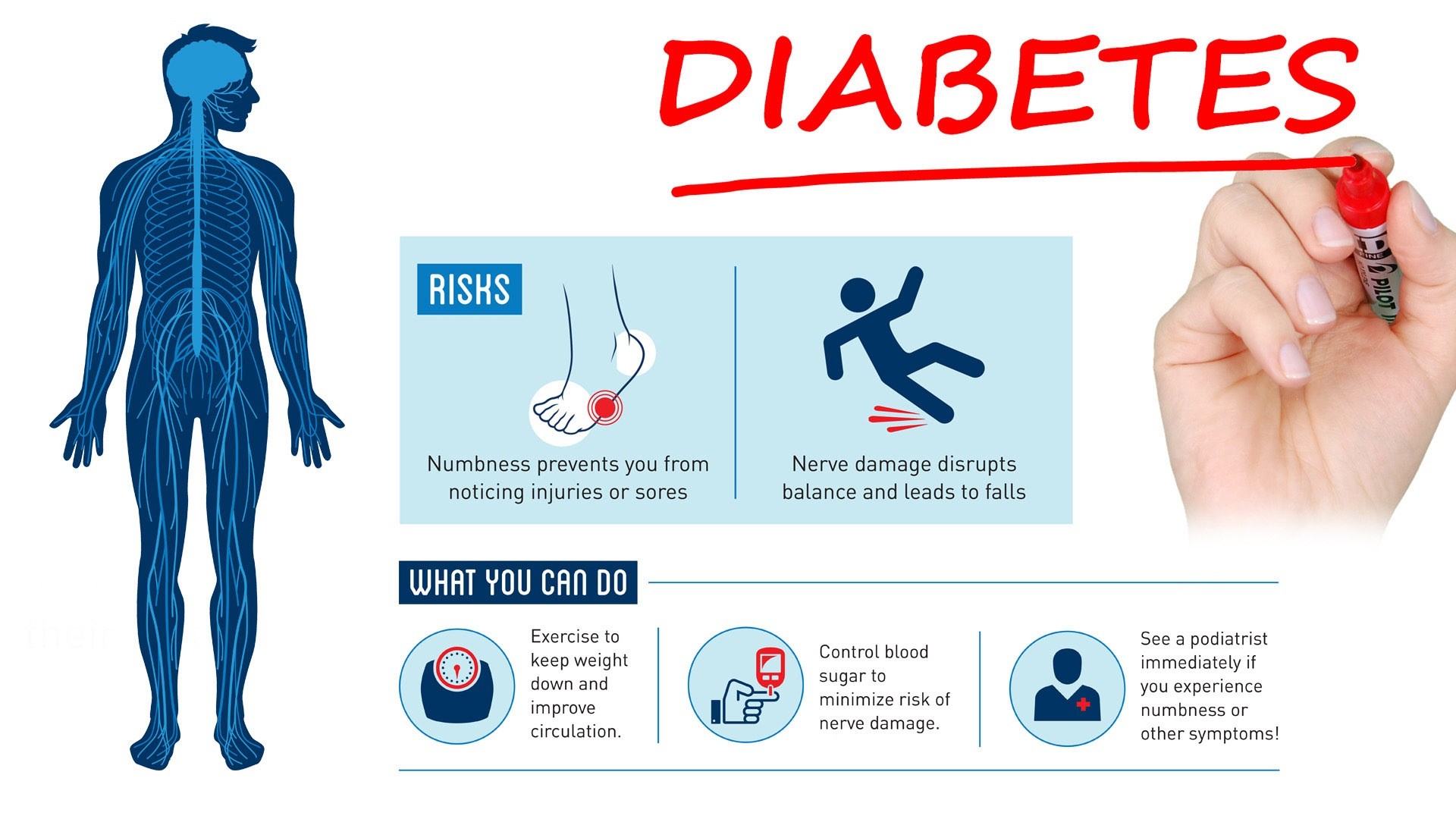Medically Reviewed by: Scientific Advisory Board
If you've recently experienced numb feet and you happen to have diabetes, it's essential to consider the connection between the two. We're here to delve into the relationship between numb feet and diabetes, so you can better understand what's going on in your body. We'll tackle the causes, the symptoms, and the importance of addressing this issue to maintain your overall health.

Numbness in the feet can be due to a condition called diabetic neuropathy. This occurs when high blood sugar levels damage the nerves in your body, particularly those in the hands and feet. In fact, about 50% of people with diabetes may develop neuropathy to some extent. That's why it's crucial to be aware of this common complication and take the necessary preventative measures.
By keeping your blood sugar levels under control and closely monitoring your diabetes, you'll significantly reduce the risk of developing neuropathy. However, if numb feet become a persistent issue, it's urgent to consult a healthcare professional for proper diagnosis and individualized treatment.
Recognizing the Symptoms of Numb Feet in Diabetics
Numb feet, medically known as peripheral neuropathy, often affects individuals with diabetes. We'll discuss the symptoms of numb feet in diabetics, so you can identify the signs early and take the necessary actions.
One of the primary symptoms is a loss of sensation in the feet. This usually starts as occasional tingling, but it can progress to constant numbness. When you're dealing with numb feet, you might not feel pain, hot or cold temperatures, or even cuts and injuries. This lack of sensation can lead to more severe problems unnoticed.
Another common symptom of numb feet is a burning sensation in the lower extremities. You may notice this pain intensifies during the night, making it difficult to sleep. This symptom can result from damage to the nerves, disrupting their normal functioning.
When experiencing peripheral neuropathy, you might also come across muscle weakness in your legs or feet. This condition can affect your balance, causing you to feel unsteady on your feet or often stumble.
Some diabetics with numb feet can experience sharp, shooting pains in their feet and legs. These pains can be intense, and they may come and go or persist throughout the day.
Numb feet in diabetics can lead to changes in the shape of the foot, causing foot deformities such as hammer toes or Charcot foot. These deformities occur due to the nerve damage leading to weakened foot muscles.
Finally, let's discuss some common risk factors for numb feet in diabetics:
- Uncontrolled blood sugar levels: High blood sugar levels can damage nerves over time, leading to numb feet. Regular monitoring and control of your blood sugar is essential in preventing neuropathy.
- Duration of diabetes: The longer you've had diabetes, the higher the risk of developing numb feet.
- Smoking: Smoking impairs blood circulation, which can contribute to numbness in the feet.
- Kidney problems: Diabetes-related kidney issues may also increase the risk of numb feet.
In conclusion, it's vital to recognize the symptoms of numb feet in diabetics early on. Early detection and intervention can help to prevent severe complications and improve overall foot health. Wearing special diabetic socks can be an additional measure to help protect and care for the feet of people with diabetes. It's essential to consult with your healthcare professional for advice and management of your diabetic feet.



Causes and Risk Factors of Diabetic Neuropathy
Diabetic neuropathy, a common complication of diabetes, occurs as a result of damage to nerve fibers. This damage can ultimately lead to numbness and tingling sensations, particularly in the feet. It's vital to understand the causes and risk factors associated with diabetic neuropathy to better manage and prevent its onset.
High blood sugar levels play a significant role in the development of diabetic neuropathy. Prolonged exposure to excess sugar can damage nerves and blood vessels, impeding the flow of oxygen and nutrients to nerve cells. Ensuring proper blood sugar control through regular monitoring, diet, and medication can help prevent this complication.
Various factors may increase the risk of developing diabetic neuropathy. Some notable risk factors include:
- Duration of diabetes: The longer a person has diabetes, the higher the risk of developing neuropathy.
- Poor blood sugar control: Inadequate control of blood sugar levels can increase the risk of neuropathy.
- Smoking: Smoking restricts blood flow and may contribute to nerve damage.
- Kidney disease: Diabetes-related kidney damage can accelerate nerve damage.
- Obesity: Extra body weight can increase inflammation and chances of neuropathy.
- Genetic factors: Some people may be more genetically predisposed to developing neuropathy.
Regular checkups and attentiveness to signs of neuropathy are crucial for early detection and intervention. According to the American Diabetes Association, over half of people with diabetes will develop some form of neuropathy. Therefore, it's essential to be proactive in managing diabetes and its potential complications.
To minimize the risk of diabetic neuropathy, we recommend adopting healthy lifestyle choices:
- Maintain a balanced diet rich in fruits, vegetables, and whole grains.
- Engage in consistent physical activity to improve circulation and blood sugar control.
- If recommended by your doctor, take prescribed medication to maintain healthy blood sugar levels.
- Quit smoking to reduce nerve damage and promote better blood flow.
- Keep track of blood sugar levels, targeting a healthy range as advised by your healthcare team.
By understanding the causes and risk factors associated with diabetic neuropathy, we can take proactive steps to manage our diabetes and prevent complications. A combination of healthy choices, medication, and regular monitoring can significantly reduce the risk of developing numb feet diabetes and promote a better quality of life.
Effective Treatments for Numb Feet in Diabetes
Experiencing numb feet can be a common issue for individuals with diabetes, particularly those suffering from diabetic neuropathy. Let's explore the various treatment methods that can make a significant difference for diabetic patients who are struggling with numb feet.
Glycemic control is the foundation of all other treatments. Maintaining blood sugar levels within the recommended range is crucial to alleviating symptoms and preventing further progression of numbness.
- Regularly monitor blood glucose
- Make necessary adjustments to diet
- Discuss medication options with a healthcare professional
Another essential component is proper foot care, which can prevent complications associated with numb feet, such as ulcers and infections.
- Inspect feet daily for wounds or irregularities
- Keep feet clean and dry
- Use high-quality diabetic socks
- Choose supportive, well-fitting shoes
Pain management is also an important consideration, as it can improve quality of life for people dealing with numb feet due to diabetes.
- Over-the-counter pain medications may provide relief
- Prescription therapies, such as anti-seizure medications or antidepressants, offer more targeted treatment
- Consult a healthcare professional for personalized recommendations
In addition to these fundamentals, there are several complementary therapies that can be explored for further relief.
- Acupuncture may alleviate localized pain
- Engage in relaxation techniques, such as meditation or yoga
- Biofeedback therapy can teach patients to gain control over symptoms
- Consult with a healthcare professional or a specialist in alternative medicine
By incorporating regular physical activity, diabetic patients can also improve circulation and promote overall health, further reducing the severity of numb feet.
- Opt for low-impact exercises, like swimming or walking
- Avoid prolonged periods of inactivity
- Discuss a personalized exercise plan with a healthcare professional
The final piece of the treatment puzzle is professional medical intervention.
- Address underlying causes, such as vitamin deficiencies or kidney issues
- Receive routine check-ups to monitor progress
- Explore surgical options for severe cases, including nerve decompression or spinal cord stimulation
These treatment methods, when implemented consistently, can dramatically improve the lives of diabetes patients dealing with numb feet. Remember, it's essential to work closely with a healthcare professional and advocate for personalized care to achieve the best possible outcome.
Conclusion
Our discussion on numb feet diabetes has revealed several important aspects of this condition. It's crucial to be well-informed and vigilant in managing both diabetes and the symptoms of numb feet. By taking preventative measures and seeking timely medical assistance, we can effectively reduce the risk of complications.
Key takeaways from our article include:
- Numb feet is often a symptom of diabetic peripheral neuropathy, a common complication of diabetes
- Regular monitoring of blood glucose levels is essential in preventing and managing numb feet
- Proper foot care and hygiene can significantly minimize the risk of infections and ulcers
- Wearing specially designed diabetic socks
Lastly, we must remember that communication with healthcare professionals is critical to ensure proper management of diabetes and its complications. By staying one step ahead, we can take control of our health and maintain a higher quality of life. As always, this information is intended to help guide your understanding of numb feet diabetes, but consulting with your doctor is essential for personalized advice and care.
References, Studies and Sources:
https://my.clevelandclinic.org/health/diseases/21510-diabetic-feet
https://www.cdc.gov/diabetes/library/features/healthy-feet.html
https://www.mayoclinic.org/diseases-conditions/diabetic-neuropathy/symptoms-causes/syc-20371580
More About Circufiber.com and Healthcare disclaimer:
Always consult your physician before beginning any program. This general information is not intended to diagnose any medical condition or to replace your healthcare professional. If you experience any pain or difficulty, stop and consult your healthcare provider. Circufiber.com socks are clinically proven to improve micro-circulation in feet and lower extremities in people with Diabetes.
More Author Information:
Dr. Capozzi is a board-certified foot surgeon through the American Board of Foot and Ankle Surgery. He is a Diplomate of the American Academy of Wound Management and Fellow of the American College of Foot and Ankle Surgeons. He completed a three-year residency program in Foot and Ankle Reconstructive Surgery at St. Francis Hospital & Medical Center in Hartford, CT in 2010. Dr. Capozzi is a board-certified Wound Specialist® granted by the American Academy of Wound Management. He is also board-certified in Foot Surgery through the American Board of Foot and Ankle Surgery.




